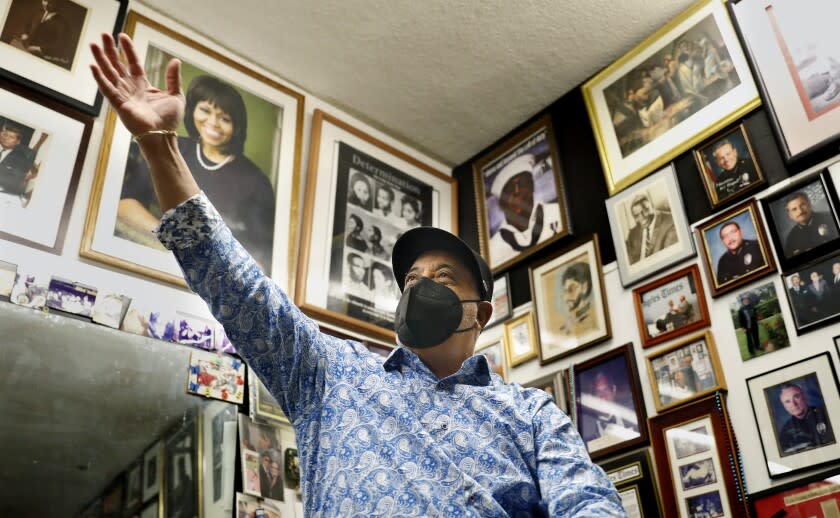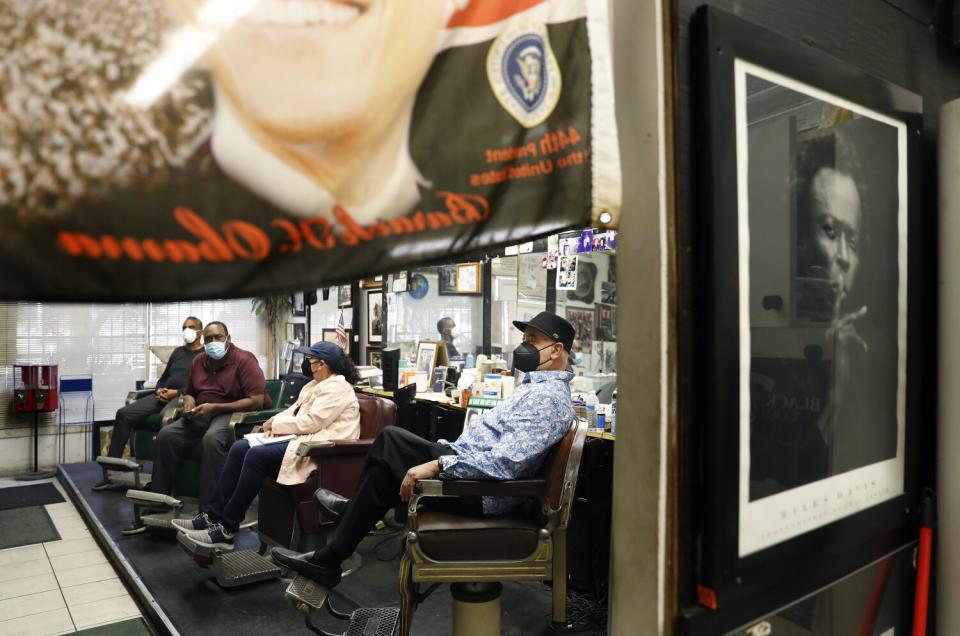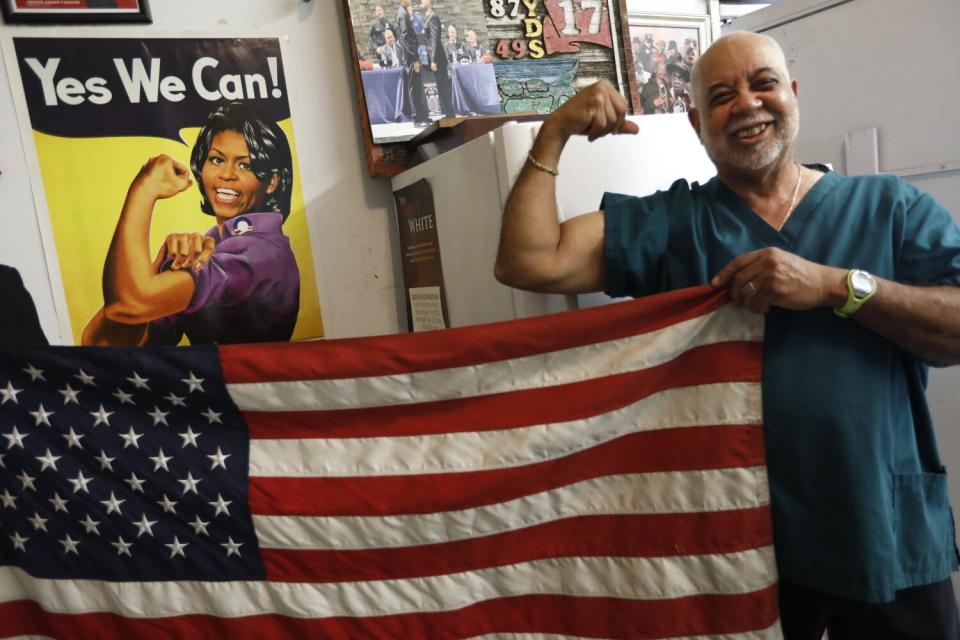Column: They never thought they'd see a Black president, or another assault on voting rights

- Oops!Something went wrong.Please try again later.
One morning in early November 2008, Lawrence Tolliver and his family walked from his home on West Adams Boulevard to McCarty Memorial Church, where he cast a vote for Barack Obama.
“It’s a glorious day,” the Alabama native said before leaving his house, telling me he had long wondered if he’d live long enough to see a time when a Black candidate might be elected president.
I tagged along with Tolliver, his wife Bernadette and their adult children Aaron, Bernard and Alexandra. At the polling place, a neighbor named Lounetta Rhodes told me she had moved west from Texas, where her grandfather had to pay a poll tax to cast a ballot, so “he had to save his dimes to make sure he could vote each year.”
Later that same day, Tolliver hosted a victory party at his South L.A. barbershop.
“It’s a miracle,” he said, his walls graced with photos of Nelson Mandela, the Rev. Martin Luther King Jr. and dozens of other heroes.
The Rev. Ron Simmons of West Angeles Church of God in Christ offered a prayer about the journey from slavery to the civil rights movement to the Obama victory.
“Oh Lord,” Simmons said, “you brought us a long way.”
More than 13 years later, that road has taken a sharp turn, back into the past. We haven’t yet seen a move to reinstate the poll tax. Not yet, anyway. But Joe Biden’s sound defeat of President Trump in 2020 unleashed unhinged claims that the election was stolen, and more than a dozen states have since enacted voting rules expected to suppress minority votes.
The tactics include neutering secretaries of state and restricting registration, voting times and mail-in ballots.
Last week, I met with the Tollivers and some of the longtime customers at the barbershop. The language was as sharp as Tolliver’s shears. The tone was a bitter blend of heartbreak, rage and resignation that the nation’s most reprehensible sins may never be buried.
These are people whose ancestors were sharecroppers, and whose families headed west to escape Jim Crow. Lawrence Tolliver said his elders told him a country built on the backs of slaves would never be free of bigotry, and yet he wanted to believe the country could evolve.

“I was just so happy for America, and I said we had finally turned the corner,” Tolliver said of Obama’s rise. “And as happy as I was then, I’m just as saddened, disheartened and discouraged by the acts going on now to suppress or deny the vote.”
Tolliver had with him a lawn sign with a photo of military veteran and civil rights activist Medgar Evers, who was assassinated in 1963 by a member of Mississippi’s White Citizens' Council.
“He gave his life for our right to vote,” says the poster, which Tolliver plants on his front lawn around election time. Tolliver said he would tell anyone trying to interfere with Black people’s right to vote that they’re on the same team as the guy who killed Evers.
Evers’ daughter once visited his barbershop, Tolliver said. He knelt at her feet, thanking her for her father’s service and sacrifice.
If those sacrifices by Evers and legions of others were the foundation of Obama’s rise decades later, victory came at a price, said Bernadette Tolliver.
“It just really released a lot of hatred and racism,” she said. Now, with voting obstruction tactics so blatant, including the installation of Trump disciples to take control of election systems, she fears some Black voters will lose faith that their votes matter.
As we spoke, the failure of President Biden’s attempts to push voting rights protections through Congress had drawn criticism from some civil rights activists, and the U.S. Supreme Court was expected to soon deliver a death blow to affirmative action. Closer to home, a video surfaced just a few days ago of someone at a Laguna Hills basketball game calling a Black Portola High player “a monkey” and asking “who let him out of his cage?”
“Trump actually fueled the fire there,” said Nate Thibodeaux. “I don’t know what the answers are, but it seems like it gets worse instead of better.”
Simmons was reminded of his own experience with racism as a high school student during desegregation in 1970, when he was bused from Morningside High to mostly white Inglewood High. He said his bus was greeted by people with signs saying N-word go home.
“They didn’t want us there and when we got off the buses, we fought every day,” Simmons said.
“And Black people weren’t allowed on public beaches,” said Mike Washington.

On many fronts, there’s been progress in the half century since then, and Tolliver noted that white people have always been part of the civil rights movement. But resistance to the continued diversification of the U.S. has further exposed strains of venomous hatred masked as virtue and patriotism.
The Republican Party has been “hijacked,” Washington said. “It’s become the poster boy for Jim Crow,” and attempts to suppress the vote are a form of “American apartheid.”
It’s a shameless effort to hold power and put others down, said Tolliver, who nearly quoted a Bible passage verbatim but got a little help from Simmons: “For what will it profit a man if he gains the whole world and loses his soul?”
Rod Wright pushed back a bit, saying a lot of people wish Biden would have tried harder on voting rights protections and climate change initiatives. He said even Obama didn’t get as much done as many people in the Black community hoped he would have.
Tolliver argued that obstructionists were out to nullify Obama and crush Biden. Being Black made the job harder for Obama, Tolliver said, and his two-term presidency was invaluable in giving people of color a greater sense of possibility.
But people took a deep breath, said Washington, and rested when Obama got elected even though there was more work to be done.
Maurice Kitchens, who as a Chicago boy of about 12 marched with MLK, said there was neither then nor now any room for complacency, and the notion of Obama’s presidency as the beginning of a post-racial era ignored hard truths about American society.
William Taylor, a barbershop regular who couldn’t join the conversation, called the shop because he wanted to add his thoughts. He mentioned the Medgar Evers poster that Tolliver was still holding next to his barber chair.
“Our ancestors have given too much for us to lose the right to vote,” Taylor said.
The barbershop consensus echoed that sentiment — that all attempts to discourage voting must be met with fierce opposition, and with greater turnouts than ever. The call to rise up is neither seasonal nor temporary.
“I don’t think they’re going to be able to suppress the vote,” Simmons said. “Because of everything going on now, people will get out there and vote.”
steve.lopez@latimes.com
This story originally appeared in Los Angeles Times.

